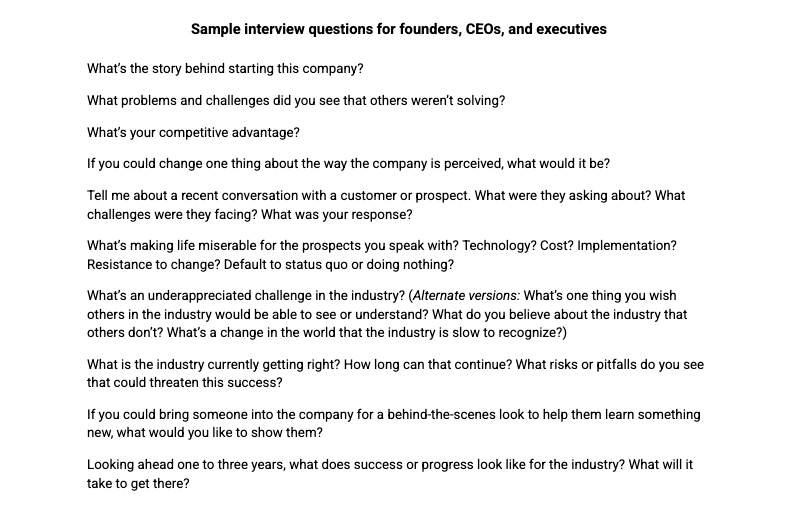Look through job openings for content and communications positions and you’ll find a lot of the same phrases repeated:
Exceptional writing and storytelling ability
Deep expertise in content strategy (or media relations, digital marketing, measurement, etc.)
Strategic mindset
Strong project management skills
Now step back and think about the requirements not listed.
When’s the last time you saw any mention of interviewing skills? It’s probably been a while.
The ability to plan, execute, and synthesize interviews with founders, executives, subject matter experts, and outsiders like customers and influencers, is a skill unto itself. Producing just about any type of unique and insightful content hinges on these interviews with the leaders and expert practitioners who are in tune with market trends.
This is especially true for thought leadership. Whether it’s the CEO or someone else you’ve identified to share industry insights, the team members or agency hands doing the interviewing need to make the most of each opportunity to tap into the thought leader’s thoughts.
“If I’m honest, there’s an art in running interviews… So, it’s not an easy feat. But with structure and intentionality, you can get your interviews to a very good level. Ultimately, the interview is a means to an end – each one should yield 8-10 content ideas.” – George Chasiotis, head of B2B growth agency Restartt, in his GrowthWaves newsletter, June 24, 2025
Profile of the skilled interviewer
The best interviewers do several things well.
First, they prepare. We all know the basics: Read what the interview subject has written or said, discover what topics they tend to talk about, and study the company, its competitors, the market, and big challenges the industry is facing. Beyond that, get to a working knowledge of how the money flows. (This is an essential part of doing B2B marketing for healthcare startups and vendors, providers, payers, pharma, and employer groups.)
Probably the single most important trait here is to have a high level of curiosity about the business and the experts being interviewed.
A note of caution: Over-preparing can lead to overlooking big-picture questions. It’s OK to be ignorant about certain details in advance. Ask a broad question in the interview, and use your natural curiosity to dig deeper.
Next, they direct the conversation. Good interviewers put on their reporter’s hat – even if they’ve never worked as a journalist – and probe to get useful responses.
To make this work, determine in advance what you want to get out of the interview. Share those goals with the leader you’re interviewing. Come back to it as you’re in the conversation.
And yet, there’s a time and place to veer off script. Listen for clues that your expert has something compelling to say about a related topic or lights up when telling a story that yielded an unforeseen insight. Maybe you want to shift to that topic on the spot, or make a note to set up another discussion.
Here’s a phrase to look for: “This probably isn’t very interesting, but…” Bingo! You’ve been tipped off that a good unplanned insight or story is about to come.
Finally, good interviewers synthesize what they’ve heard, give it context, and root out the best storylines. They consider the intersection of what the audience has shown it’s interested in and the expert’s compelling, unique, or contrarian point of view. And then go to work in that shared little space in the Venn diagram.
This is where AI tools can help immensely. Yes, with summarizing key points and direct quotes, but also by identifying what’s missing. Ask AI to show you any gaps your audience would want to see filled, and if necessary, follow up with your expert to get more or deeper insights.
What this looks like in practice
Interviewing leaders and SMEs is a required part of most marketing and comms jobs, even if it’s not in the job description. Like with any skill, there are plenty of resources for learning how to improve.
I’ve thought more about interviewing since hanging out a shingle as a consultant in thought leadership strategy and content. It’s an area where I’ve got a load of experience, going back to my journalism days. But I want to keep improving, so I’ve been collecting some good advice I’ve read from marketing and communications leaders.
Here’s a rough outline of the steps I’d recommend to get the most out of your expert interviews:
Set parameters for the discussion. You have limited time and opportunities with founders, CEOs, executives, and SMEs. Determine in advance which audiences need to hear a thought leadership message, frame the interview with the idea and the topic, and, as noted earlier, set goals or desired outcomes – creating a tentpole content asset, for example, or developing key messages for a panel discussion.
Conduct the research. This is all about being prepared for the discussion. Get up to speed on topics, company goals, emerging industry trends, competitors’ points of view, a recent spike in news coverage about a given issue. The list can go on.
Develop a set of questions that you’ll send in advance to get the interview subject primed for the discussion. How many? Hard to say, but at least five and probably no more than a dozen.
Some questions yield better outputs than others. For content creation, nothing beats the one-two punch of data and customer/prospect challenges.
Often, companies and leaders are reluctant to share internal data. Ask for it anyway and see what’s available – if possible, in advance of the interview so you can get color commentary during the discussion and determine how best to use the data.
And never miss an opportunity to pursue what customers or prospects are talking about. Insights from thought leaders don’t occur in a vacuum – they’re informed by the challenges that customers or the industry in general are facing.
For jump-starting your own interview questions, here’s an amalgamation of questions I’ve developed and adapted from others for interviews with founders and CEOs:

Make the interview a conversation, not an interrogation or capitulation. The research and advance questions should give any interviewer confidence to carry on a good conversation as though it’s meeting a friend for coffee.
Typically there’s no need to grill your subject. At the same time, don’t passively concede your authority as an interviewer. Sitting back and not challenging or probing is a good way to get a mediocre outcome that doesn’t establish any new ground. If you’re developing thought leadership, it’s essential to listen carefully to be sure your subject isn’t simply repeating conventional wisdom. If they are, it’s time to ask a question like “What’s something you believe that puts you in the minority?”
With some interview subjects, it makes sense to start with an easier or more broad question, then move into details. Other experts want to cut to the chase. For people I’m interviewing for the first time, I tend to start with something softer to prime the conversation, and if they seem impatient or bored, I adjust quickly with a more challenging question.
Review and come to some conclusions. A lot of interviewers jump right to the transcript of the recording and AI-generated outline, but I like to start by reviewing my own handwritten notes. Then I go back and review the transcript and audio. It always helps to review as soon after the interview as possible. The review stage should give you the ideas you need to move forward with content ideas or assets, and if not, it might be necessary to send a follow-up note or even schedule additional time.
The long view
Over the course of several interviews or regularly scheduled meetings, interviewers see patterns in the way interview subjects speak.
Does the expert talk in formal language or industry jargon? Use guarded language as opposed to opening up? Have trouble staying focused on the topic at hand? These are all tendencies to account for in future interviews. It might take some planning and creativity ahead of the next discussion to overcome these and other common hurdles.
Above all else, remember that the interviewer-subject relationship is human-to-human. As trite as that might sound, keeping the mental picture of talking with a friend, listening intently, asking questions, and prompting more details about the stories they’re telling will go a long way toward getting the insights you need.


 Can AI build an accurate B2B healthcare persona?
Can AI build an accurate B2B healthcare persona?